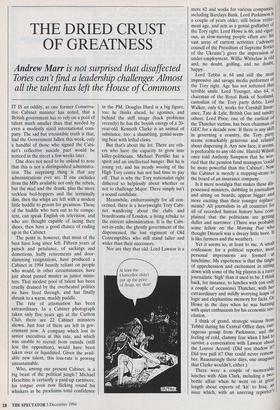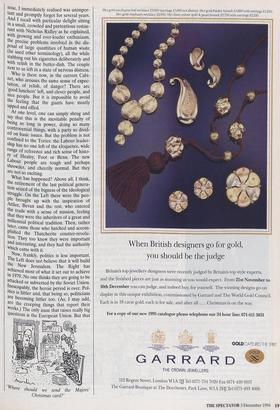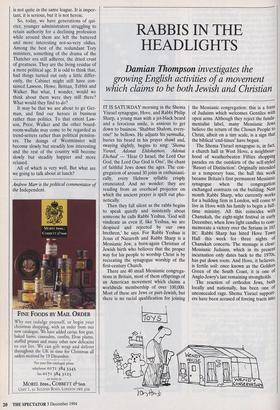THE DRIED CRUST OF GREATNESS
Andrew Marr is not surprised that disaffected
Tories can't find a leadership challenger Almost all the talent has left the House of Commons
IT IS an oddity, as one former Conserva- tive Cabinet minister has noted, that a British government has to rely on a pool of talent much smaller than that needed by even a modestly sized international com- pany. The sad but irresistible truth is that, had the Government fallen this week, only a handful of those who signed the Cabi- net's collective suicide pact would be noticed in the street a few weeks later.
One does not need to be unkind to note that this is not a distinguished administra- tion. The surprising thing is that any administrations ever are. If one excludes from the MPs available not only the rebels, but the mad and the drunk, plus the more reckless bed-hoppers and the terminally dim, then the whips are left with a modest little huddle to groom for greatness. Those of the huddle who turn out to be compe- tent, can speak English on television, and who are thought capable of lacing their shoes, then have a good chance of ending up in the Cabinet.
The point is, however, that most of the best have long since left. Fifteen years of putsch and petulance, of sackings and demotions, huffy retirements and door- slamming resignations, have produced a Cabinet in 1994 heavily reliant on people who would, in other circumstances, have just about passed muster as junior minis- ters. That modest pool of talent has been cruelly drained by the overheated politics we have lived through, and has finally shrunk to a warm, muddy puddle.
The rate of attenuation has been extraordinary. In a Cabinet photograph taken only five years ago at the Carlton Club, there are 22 Cabinet ministers shown. Just four of them are left in gov- ernment now. A company which lost its senior executives at this rate, and which was unable to recruit from outside (still less the opposition), would have been taken over or liquidated. Given the avail- able new talent, this loss-rate is proving unsustainable.
Who, among our present Cabinet, is a big beast of the political jungle? Michael Heseltine is certainly a paid-up carnivore, his tongue even now flicking round his whiskers as he proclaims total confidence in the PM. Douglas Hurd is a big figure, too: he thinks ahead, he agonises, and behind the stiff image (back problems recently) he has the boyish energy of a 20- year-old. Kenneth Clarke is an animal of substance, too: a shambling, genial-seem- ing bear with lethal claws.
But that's about the lot. There are oth- ers who have the capacity to grow into killer-politicians. Michael Portillo has a spirit and an intellectual hunger. But he is young yet, and his steady wooing of the High Tory centre has not had time to pay off. That is why the Tory nationalist right dithered so helplessly about whether or not to challenge Major. There simply isn't a sound candidate.
Meanwhile, embarrassingly for all con- cerned, there is a heavyweight Tory Cabi- net wandering about the clubs and boardrooms of London, a living rebuke to the current administration. It is the Cabi- net-in-exile, the ghostly government of the dispossessed, the lost regiment of Old Contemptibles who still stand taller and wider than their successors.
Nor are they that old. Lord Lawson is a mere 62 and works for various companies, including Barclays Bank. Lord Parkinson is a couple of years older, still below retire- ment age, and acts as a genial godfather of the Tory right. Lord Howe is 68, and vigor- ous, as slow-moving people often are: his vast array of current activities ('advisory council of the Presidium of Supreme Soviet of the Ukraine') gives the impression of under-employment. Willie Whitelaw is old and, no doubt, golfing, and no doubt, happy. Lord Tebbit is 64 and still the most impressive and savage media performer of the Tory right. Age has not softened that terrible smile. Lord Younger, also 64, is chairman of the Royal Bank of Scotland, custodian of the Tory party debts. Lord Walker, only 63, works for Cornhill Insur- ance, Tate & Lyle, British Gas and sundrY others. Lord Prior, one of the earliest of the Thatcher victims, has been chairman of GEC for a decade now. If there is any skill in governing a country, the Tory partY seems remarkably generous and relaxed about dispersing it. Any new face, it seems, is preferable to any old one. Harold Wilson once told Anthony Sampson that he wor- ried that the pension fund managers 'could be more powerful than the Cabinet'. Now the Cabinet is merely a stepping-stone to the board of an insurance company. Is it mere nostalgia that makes these dis- possessed ministers, dabbling in journalism and sitting on boards, appear bigger and more exciting than their younger replace- ments? All journalists in all countries for all of recorded human history have com- plained that the politicians are getting duller and narrower. (There was probably some fellow on the Morning Post who thought Disraeli was a dreary little bore. It is like farmers and the weather). Yet it seems so, at least to me. A small confession: for a political reporter, most personal impressions are formed at lunchtime. My experience is that the tingle of apprehension and excitement in sitting down with some of the big players is a rarer journalistic 'high' than it used to be. I think back, for instance, to lunches with (on only a couple of occasions) Thatcher, with her extraordinary and mildly worrying leaps of logic and elephantine memory for facts. Or Howe in the days when he was burning with quiet enthusiasm for his economic rev- olution.
I think of grand, strategic visions from Tebbit during his Central Office days, out- rageous gossip from Parkinson, and the feeling of cold, clammy fear when I had to survive a conversation with Lawson about the Louvre Accord. (Did you shadow it? Did you pull it? One could never remern- ber. Reassuringly these days, one imagines that Clarke wouldn't, either.) There were a couple of memorable lunches with Alan Clark, including a two- bottle affair when he went on at great length about exports of 'kit' to Iraq, ar issue which, with an unerring reporter s nose, I immediately realised was unimpor- tant and promptly forgot for several years. And I recall with particular delight sitting in a small, crowded and pretentious restau- rant with Nicholas Ridley as he explained, With growing and ever-louder enthusiasm, the precise problems involved in the dis- posal of large quantities of human waste (he used other terminology), all the while stabbing out his cigarettes deliberately and With relish in the butter-dish. The couple next to us left in a state of nervous distress.
Who is there now, in the current Cabi- net, who arouses the same sense of expec- tation, of relish, of danger? There are `good lunchers' left, and clever people, and nice people. But it is impossible to avoid the feeling that the giants have mostly Upped and offed.
At one level, one can simply shrug and say that this is the inevitable penalty of being so long in power, doing so many controversial things, with a party so divid- ed on basic issues. But the problem is not confined to the Tories: the Labour leader- ship has no one left of the eloquence, wide range of reference and rich sense of histo- ry of Healey, Foot or Benn. The new Labour people are tough and perhaps Shrewder, and cheerily normal. But they are not so exciting. What has happened? Above all, I think, the retirement of the last political genera- tion seized of the bigness of the ideological struggle. On the Left there were the peo- ple brought up with the inspiration of Attlee, Bevan and the rest, who entered the trade with a sense of mission, feeling that they were the inheritors of a great and mt. liennial political tradition. Then, rather inter, came those who hatched and accom- plished the Thatcherite counter-revolu- tion. They too knew they were important and interesting, and they had the authority Which came with it. Now, frankly, politics is less important. The Left does not believe that it will build the New Jerusalem. The Right has achieved most of what it set out to achieve in 1979. No one thinks they are going to be attacked or subverted by the Soviet Union. Inescapably, the heroic period is over. Pol- itics is littler and, that being so, politicians are becoming littler too. (As, I may add, are the creeping things that report their works.) The only issue that raises really big questions is the European Union. But that 'Where should we send the Majors' Christmas card?' is not quite in the same league. It is impor- tant, it is serious, but it is not heroic.
So, today, we have generations of qui- eter, younger administrators struggling to retain authority for a declining profession while around them are left the battered and more interesting not-so-very oldies. Among the best of the redundant Tory ministers, something of the drama of the Thatcher era still adheres, the dried crust of greatness. They are the living residue of a more political age. It is odd to think that, had things turned out only a little differ- ently, the Cabinet might still have con- tained Lawson, Howe, Brittan, Tebbit and Walker. But what, I wonder, would we think about them were they still there? What would they find to do?
It may be that we are about to go Ger- man, and find our heroes in business rather than politics. To that extent Law- son, Prior, Walker and the other board- room-wallahs may come to be regarded as trend-setters rather than political pension- ers. The doings of Westminster will become slowly but steadily less interesting and the rest of the country will become slowly but steadily happier and more relaxed.
All of which is very well. But what are we going to talk about at lunch?
Andrew Marr is the political commentator of the Independent.












































































 Previous page
Previous page